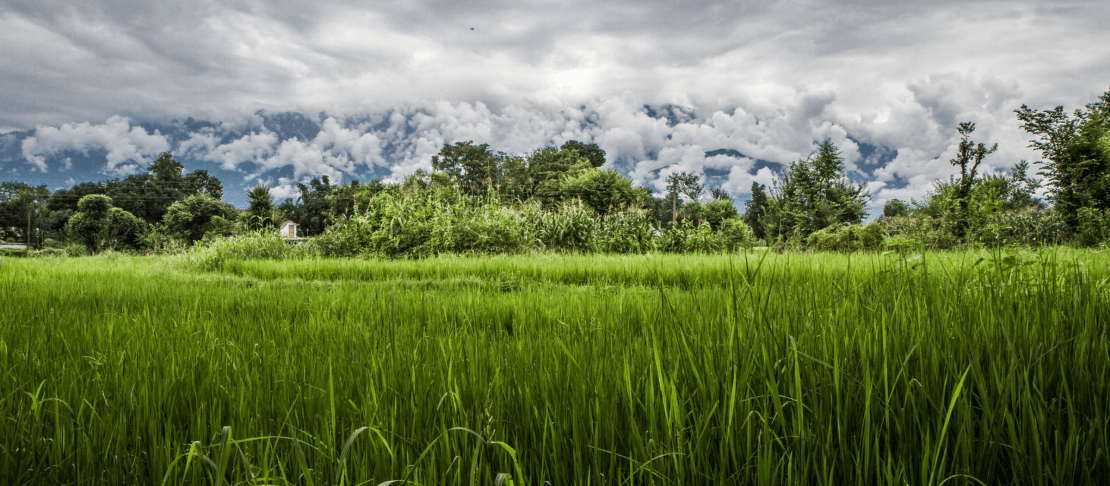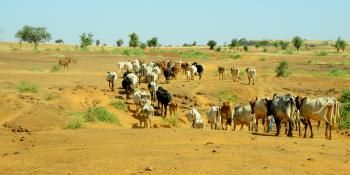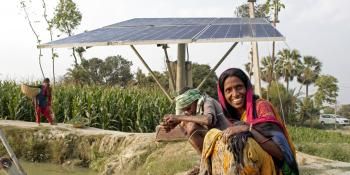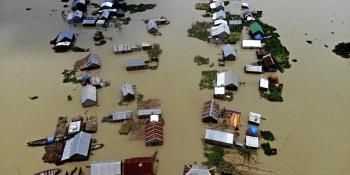Transforming food systems relies on strong partnerships and cycles of innovation

Ten years of partnership between the University of Leeds and CCAFS have shown how the next phase of CGIAR research and partnerships can drive innovation in climate-smart food systems. This innovation is underpinned by setting and contributing to research agendas, and two-way dialogue with policymakers and practitioners from across the food system. This dialogue is the engine of innovation, and the fuel is the knowledge that comes with detailed and carefully executed research.
From a natural science perspective, research begins with theory and models, supported by data, to identify the risks associated with our changing climates. From a systems perspective, research gives an understanding of the resilience of food systems to those risks. Understanding both the climate risks and the societal resilience to those risks leads to identification of adaptation options. Systems perspectives also tell us the way in which food systems contribute to climate risk (e.g. greenhouse gases). As part of this process, new questions are uncovered that can then then trigger the next cycle of innovation.
The CCAFS-Leeds partnership has fostered a number of innovation cycles, which affords me that opportunity to use the collaboration as way of illustrating how research and dialogue can generate practical knowledge. Crop-climate modelling early in the partnership found that fractional uncertainty due to temperature-driven processes in our crop model was on average larger than climate model uncertainty. This in turn led to a greater emphasis on capturing crop model uncertainty by using meta-analysis, which, along with other results from the partnership fed into research and policy agendas via the IPCC.
Early work from the partnership also identified that crop development was a dominant source of uncertainty from crop models, which led to further work to reduce that uncertainty. It also led to new methods of analyzing climate model output alongside seed system data in order to assess whether or not breeding is keeping pace with climate change. These methods reframed uncertainty from a potentially unhelpful range of possibilities at a given time into an assessment of the likely timing of important changes. Wider application of these methods led to an analysis of the timing of important rainfall changes globally, and this was presented at the 50th session of the Subsidiary Body for Scientific and Technological Advice (SBSTA50).
The results of the breeding study were stark: the process of breeding, delivery and adoption of new maize varieties in Africa, which can take up to 30 years, is lagging Africa’s changing climates. The breeding pipelines produce seed that is, in a sense, out of date by the time they reach farmers’ fields. Whilst the impact was a few percent reduction in yield, the results made it clear that both adaptation and mitigation are needed now if these impacts are to be avoided, and the study concluded with specific actions that could be taken in response to the issue.
Advising on the specific needs for adaptation and transformation towards climate-smart food systems is a sensible first step in putting research to good use. Nevertheless, knowing what to aim for is only useful if there is at least an indication of how to get there. The partnership has also worked on pathways of transformation by, for example, identifying some of the transformations that different types of farmers would need in order to radically shift agriculture away from business as usual trajectories, as well as the necessary levers to stimulate and support adaptation and change.
One ongoing theme of the work in the partnership has been the ability to combine grounded (or ‘bottom up’) analyses such as these with the top-down approaches of modelling, thus allowing us to navigate the uncertainty inherent in climate prediction, whilst planning and enabling transformation. A more recent, and very welcome, recognition amongst the research community is the importance of ensuring that these transformations are accompanied by critical analysis of its justice implications.
The agenda-setting role of the partnership will ensure that many of the current areas of work continue well beyond the lifetime of CCAFS. For example:
Understanding and measuring climate-smartness. A series of studies (see here and here) is developing indices of climate smartness – quantifying the extent to which adaptation, mitigation and increased productivity can be achieved simultaneously in agricultural practice. These indices enable the inherent trade-offs involved in agricultural planning to be articulated. The work is now being combined with crop-climate modelling in order to map out climate-smart futures.
Supporting policymakers in making climate-smart choices. Understanding and measuring climate-smartness is a first step in fostering it. There is a need to navigate the many trade-offs involved, and take advantage of the synergies. This goes well beyond CSA – it is about climate-smart food systems. For example, how can trade and domestic agricultural policies support sustainable nutrition security? The ongoing GCRF-AFRICAP project is combining systems thinking with crop-climate and emissions modelling in order to develop transformative co-produced policy pathways to climate-smart nutrition-sensitive futures. The work is grounded in a novel integrated assessment methodology that combines model projections with disciplinary expert judgment from across the natural and social sciences.
Building systemic resilience across scales. The question of how to upscale climate smart agriculture has been an important topic since the concept first evolved. Modelling and systems thinking tends to favor coarser spatial scales, and place-based studies, e.g. on the value of disruption in transformation, are hard to generalize to regional and country levels. As climate-smartness becomes both measurable and entrained into policy, integrating the evidence- and action- base across a range of scales is a clear next step. This is one of the goals of ClimBeR.



